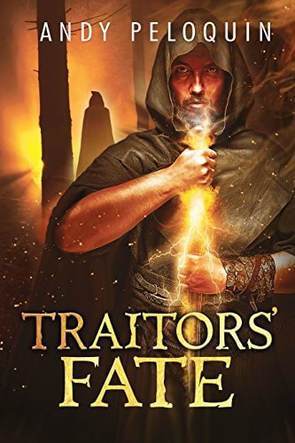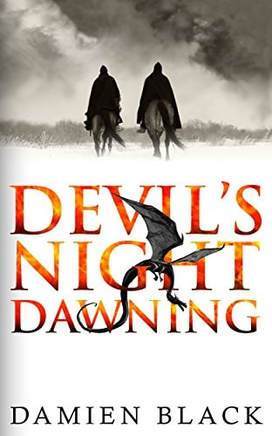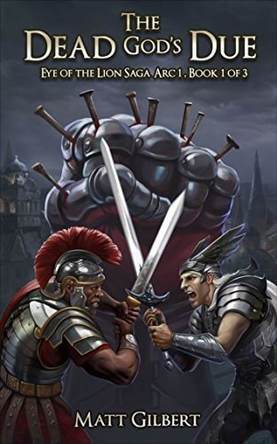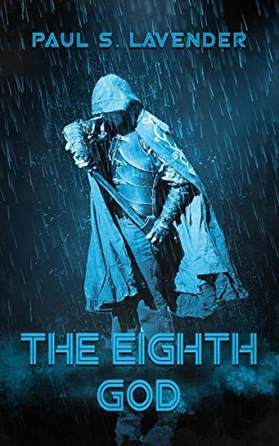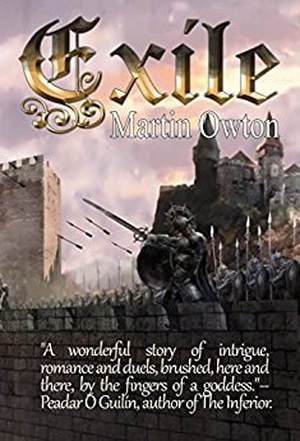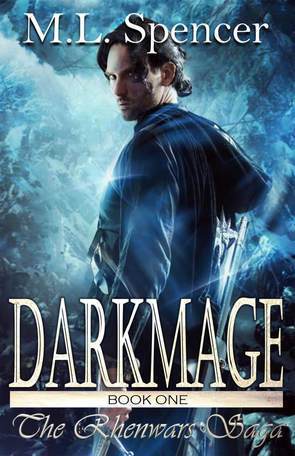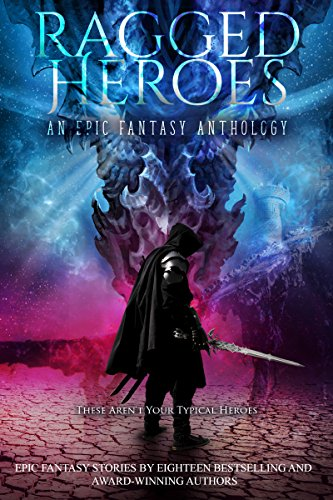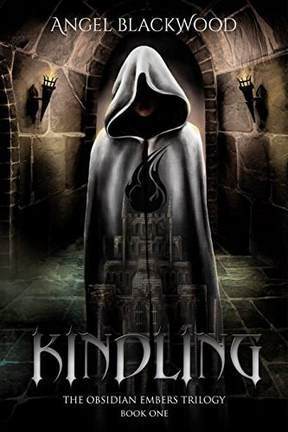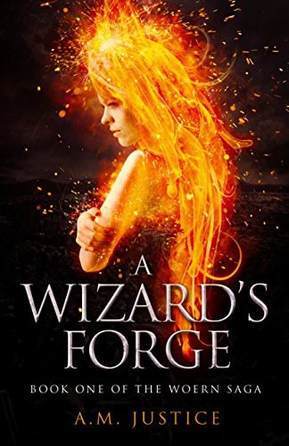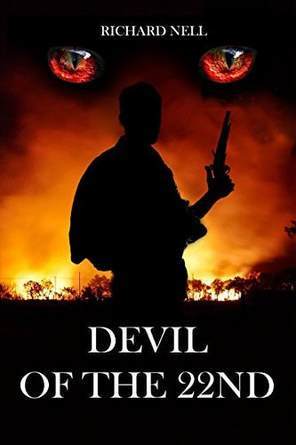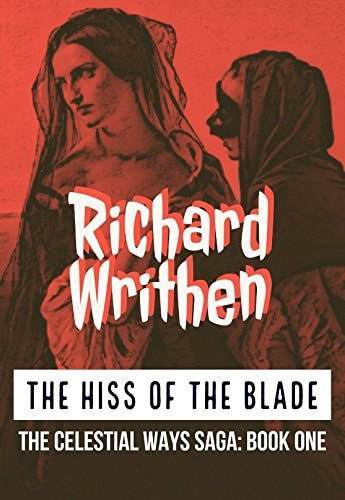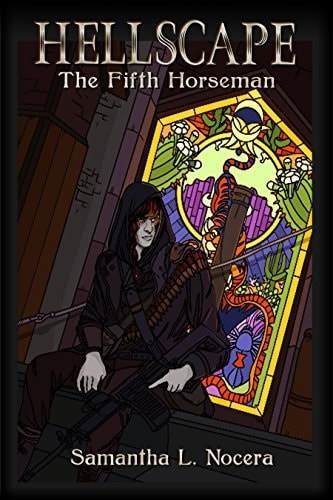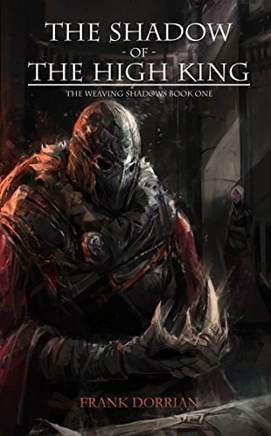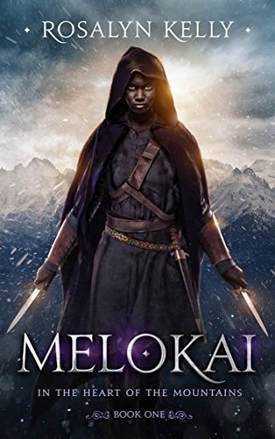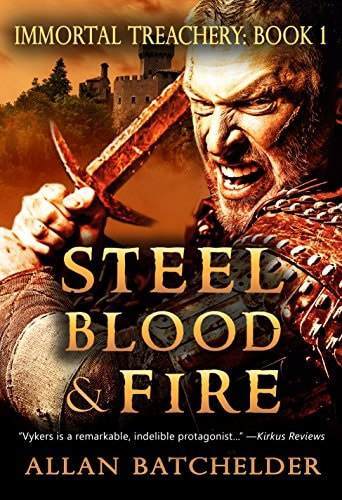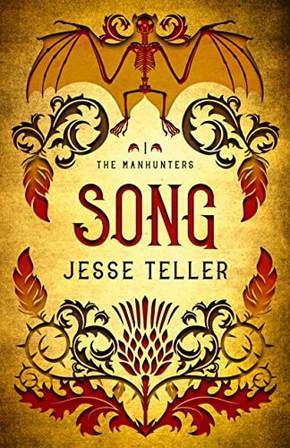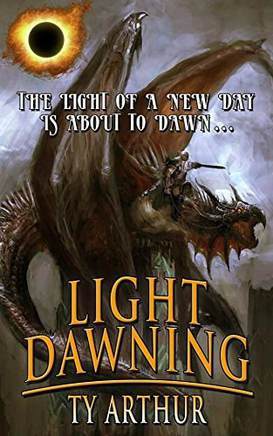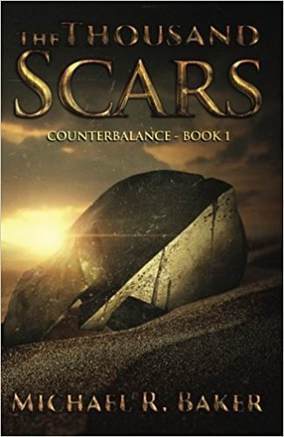Michael R. Baker's Blog, page 21
May 5, 2018
Author Spotlight: Angie Grigaliunas
I have been waiting for this book for a long time! Angie is an awesome indie author, and her latest book Quelling just launched this weekend! I had the honour of interviewing her today!
First of all, tell me about yourself! What do you write?
~Hi! Well, I’m Angie…I’m 30 (oh gosh, am I? *calculates* Yep!), been married for about 6 ½ years, love our cats and dogs, taking walks in the woods, singing, music, the fall…
I write fantasy/dystopian YA, primarily. I have a couple different projects (different levels of fantasy or dystopian, haha), by my main one is about two sisters who are kind of on opposite sides of a brewing rebellion against the brutal reigning regime in their city. But I put some of my own little spins on the more typical dystopian tropes. 
May 2, 2018
Divinity Original Sin 2 – A Masterpiece?
It’s been a while! I’ve been doing a lot of writing and editing this past month, which has took me away somewhat from my article writing. Today I bring you a review that is a very long time coming. I present to you a game which I believe was not only the best game I played last year, but it could be one of the best RPGs and Turn-Based systems ever made.
Shocking, right? Well, hear me out.
The Story
Now, I know Larian had this game in Early Access for quite some time, over a year in fact. I’m no stranger to their games over the years. Divine Divinity, Divinity Original Sin 1 and Divinity II: Developers Cut were all games I played, and overall enjoyed. I wish I backed the second DOS on Kickstarter, now I know, but I have a rule with Kickstarters in that I don’t back them. Too many failures on there, y’know? I kept a close eye on its development however. Finally the game launched in September 2017, and it really took off.
In October 2017, I applied for a job with Larian Studios. In order to do some of their written tasks, I needed a better understanding of the game. So I broke one of my rules in video games. I bought it straight away and started playing. Originally it was playing so I understood how to do my tests. Then I enjoyed it. Then I sat scratching my head.
I actually loved turn based combat.
My thoughts
I will be fair here. The hardest choice this year was picking the games after this game. Everything new I have played that had come out in 2017. Nothing. NOTHING. Comes close to this.
What a game so far! A lovechild to DnD role players, this game really packs a punch. It really is a pinnacle and a legend to RPGs in general. This game not just wins my GOTY 2017, it might, in time, be my favourite RPG of all time. Yes, even beating Morrowind, Skyrim and The Witcher 3. Kingdom Come Deliverance is also in that elite tier of games I just love playing, but Divinity Original Sin 2 is just a monster, begging to be played.
It offers a massive campaign with memorable characters, interesting role-playing options, and excellent systemic combat. There are countless options to tweak your combat style to. Want an undead lizard that can summon and turn people into chickens? Fucking sold! Want a warrior tank that can conjure fire? Yes. Loads of options and the game is huge. Act 1, which is the tutorial island, took me 25 hours to finish. And there were still several quests I did not do. And because you can do the quests in different ways, there is lots of replay ability in this game I feel. I’m now 110 hours into my first play-through, and finally in the last Act of the game. It’s still giving me thrills in the combat, and it’s just so fresh to play.
People talk a lot about gameplay loops when discussing good games. Divinity Original Sin has such satisfying combat that it is a loop that keeps me going for hours. I cannot get bored of the combat system, and the many ways you can exploit it with its dozens of mechanics. Cheesing difficult fights is not just doable, but urged. The combat involves a magic/physical armor system that was seen with some controversy from the original DOS, forcing you to make decisions in your team building, but I quite like it as it builds more strategy. It can lead to some very unfair fights, but even the ones where I got pasted felt fun. I just returned another time when I had a better idea of how to deal with it. There is little hand holding, they just give you this sandbox of tools, and you’re left to scrabble in the dirt.
The environments are beautiful and the soundtrack is solid. That alone would put it at the top of the heap, but then Larian added offline and online co-op, a PVP arena mode, and Game Master mode, the greatest throwback to the Dungeons & Dragons pen-and-paper games that underpin the entire genre. I haven’t played online much yet, but once I’ve finished the game, I plan on playing again. Because of the vast modding community, there is quite a lot to do. I will be making a good go into a new play-through with higher difficulties. The story while good, isn’t really the point of the game. For me it is that stunning game-play loop. The freedom in this game is almost unparalleled, but at the same time, it can be overwhelming. Doing this game blind is quite difficult and frustrating, as a word of warning.
The game is punishingly difficult at times, it does have some bugs and glitches, and I’ve heard the final act of the game has a weird pacing that has thrown many off. But that does not take anything away from this behemoth of a game. At £29.99, it is the best value game in years. It is also the only game I’ve played since Witcher 3 that I can give a genuine 10/10 mark. Is it a 10/10 game? Probably not objectively. It won’t be for everyone, but I will say it has one of the best gameplay loops of any video game out there on the market. Give it a go. You might be surprised.
April 11, 2018
Spring Into Fantasy Sale!
Bit of a new thing, I do not do this often! Very recently, I had the honor of joining a group of authors in an awesome book sale. My novel The Thousand Scars is amongst other awesome authors like Andy Peloquin, M.L.Spencer, Jesse Teller, TY Authur and countless others. Check them out, they’re great reads and you cannot ask for a better group of authors ^^
I’ll return with a new article soon.
ALL TITLES JUST 99¢! From April 10th-14th
One Death Changes Two Cities Forever
Two witch hunters become embroiled in the most dangerous mission of their lives when they stumble onto a sorcerous plot. War, quest, horror and magic!
A warrior priest leads an expedition to a fabled city of sorcerers, seeking allies to thwart a prophecy of doom. But could his very presence be the trigger for the prophecy’s fulfillment?
It’s all kicking off on Esterada, as a bad ass bunch of bastards try to keep an army of foul mouthed orcs at bay!
A fast-paced sword and sorcery adventure with a thread of romance
The story of a man who’s lost everything. A raw descent into madness, heroism, and sacrifice.
Eighteen bestselling and award-winning authors give you a look at what it truly means to be a hero: the simple act of standing up and making a difference, even to just one person.
With magical warfare, mad rulers, and old scores to settle, how can anyone know hero from villain? And if the people who have been fighting for years can’t tell the difference, how can Zahir choose the right side?
On an alien world, sex, murder, and vengeance forge a young woman into a wizard.
A crumbling empire. An abandoned army. Kurt Val Clause has one chance to gain everything, or lose his soul.
A conflict erupts in the region of a peninsula; a pair of mercenaries are falsely accused of switching sides in a bitter feud, a miner becomes a fugitive from a murder charge and an entire city is in danger of being cursed by an ancient monk.
What if the savior of the human race was not Christian, Muslim or Jewish? What if he wasn’t even a good man?
Tormented by the atrocities of his past, Harlin forsakes the life of a mercenary to return home and lay waste to those who brought ruin to his family.
Game of Thrones meets Kushiel’s Dart set in a ruthless land ruled by women.
Tarmun Vykers is arrogant, ruthless and bloodthirsty, and he’s the good guy…
A mass prison break spurs an exiled court wizard to form a crew of vigilante bounty hunters. It takes nightmarish skills to track down magic-slinging fugitives.
Hunted by an invading empire wielding dark magic, four desperate anti-heroes will either save the city of Cestia… or utterly destroy it.
An estranged young scholar joins forces with a vengeful necromancer for survival.
April 3, 2018
Author Interview: Alex Anthony
It has been a while since my last post, I know. Sorry about that, but today I bring you an awesome interview with Alex Anthony, whose debut novel Servant of Rage came out just today. Go check it out, I’ll leave a link down below. Enjoy his book and the interview I’m honored to share!
First of all, tell me about yourself! What do you write?
Hey there, Michael (and everyone else!). I’m A.Z. Anthony and I write pretty much everything SFF (sci-fi / fantasy). By day I’m a ghostwriter, working on sci-fi and fantasy novels for my clients, and by night I’m an author in the midst of publishing my debut fantasy trilogy. I enjoy writing darkly comedic characters and survival situations that push them to their limits.
How do you develop your plots and characters?
Well, I used to come up with a story, then fill it with the appropriate characters, but recently I’ve developed some characters I really enjoy and have been finding trouble for them to get into. When it comes to actually laying out a plot, I prefer to think about the elements I want to have in a story, then find a way to combine them all into one. For example, when I was developing the plot for my first novel I wanted magic that came at a heavy price, small groups of deadly individuals playing a game of cat and mouse, a non-Eurocentric setting, and an excuse to write some seriously fun (and explosion-filled) fight scenes. It took a while, but eventually I managed to find a premise that allowed all those factors to work.
Tell us about your current project.
I’m in the middle of publishing my debut novel, Servant of Rage, and plan to start writing its sequel in March. In the meantime, however, I’m working on a standalone novel that I’m very excited about. It features a darkly comedic “gentleman adventurer,” his legendary ego, and his personal biographer as they brave a jungle in which everything, including some of the plants, are trying to eat them. They are, of course, in search of three simple things: wealth beyond measure, fame beyond reason, and maybe a small kingdom somewhere warm.
Who would you say is the main character of your novels? And tell me a little bit about them!
The main character of Servant of Rage is Subei, Son of None. He’s a headhunter for the Ghangerai – a powerful khanate of steppe nomads, and the peoples they’ve conquered – currently bulldozing its way through the settled societies of the world. Subei is an ambitious person, and when he’s cursed / blessed (we’ll let the readers decide which) by otherworldly powers, he finds himself in a unique position to both serve his khan and carve out his place in the great history of his people.
What advice would you give new writers on how to delve into creative fiction?
Be like Nike and Just Do It. Grab a computer, or pen and paper, or whatever you need, and write. A lot of people like to talk about writing, but I’ve found the quiet ones who pound away at their keyboards consistently, are the ones who make great progress as writers. Also, always, always, always write what you enjoy. Fun writing makes for fun reading.
What real-life inspirations did you draw from for the worldbuilding within your book?
I’ve always been fascinated with history, and particularly, with nomadic peoples. The infamous Mongols, the Scythians, Turkic nomadic tribes, and even the Beja people of Sudan. All of these were inspirations for me and I’ve spent many hours studying their histories. The Ghangerai khanate in Servant of Rage was heavily inspired by these peoples. I also find it incredibly interesting how the Mongols – previously a scattered and relatively ignored people – were able to band together and steamroll the settled societies around them in order to create the largest land empire in history. It’s a topic that’s also interested me and I’m constantly learning more about it.
What inspires you to write?
Escapism, I suppose. I love the idea that my stories can help someone relax at the end of a long day, or take their minds off a troubling topic in order to spend some time in a world of fantasy. I think it’s a worthy thing to contribute to society. Also, it’s just plain fun.
What was the hardest part of writing this book?
The learning curve, I think. I started Servant of Rage in college, and hadn’t properly written a novel before it. The actual writing came easy to me, but the process of planning a novel from start to finish, of hitting the right beats at the right time, of appropriately showing character growth, was all new to me. Since then I’ve written numerous novels and while I’ve gotten better at all that, it’s a continual learning process.
What was your favorite chapter (or part) to write and why?
The second to last chapter features the final fight scene of the novel and it’s a doozy. I had a blast writing it because the characters were at their “final form” in terms of book one, so there was no holding back. Throughout the book the characters are learning new powers and how to use them, but in this fight, they’re so drugged up on power that they’re inventing new attacks on the fly. It was awesome to write with such freedom.
Did you learn anything from writing this book and what was it?
Oh jeez. I learned a ton. There’s really too much to list here, but I think the most important thing I learned is to write what you’d like to read. I said it earlier, but I’ll say it again because I think it’s important: fun writing makes for fun reading.
It’s sometimes difficult to get into understanding the characters we write. How do you go about it?
I try to force myself to think and act as the characters would. It’s an acquired ability and I’m still learning it, but I try to distance myself from my own thoughts, feelings, and motivations. By doing so, I can focus on what the character wants. This helps me organically discover what the character would do, and not what I would do.
What are your future project(s)?
After publishing Servant of Rage I’m planning to finish up my standalone novel, which is currently unnamed. That novel will be queried to agents. In the meantime, I’ll write the sequel to Servant of Rage for release in Summer, and then the final book of the trilogy for release in Fall. It’s going to be a busy year, but it’ll be worth it.
If you couldn’t be an author, what ideal job would you like to do?
This is an odd one, but I used to work in the tourism industry in a position where I helped manage an association of Florida’s largest theme parks. I really enjoyed that job. There’s a big focus on encouraging people to come to the state, but also on helping them have the best vacation they can. It’s a very interesting culture in Florida (there’s a reason it’s looked to worldwide as a model for attracting tourists) that truly cares about giving visitors the best trip they’ve ever had. It permeates down from the people like me, sitting in offices at the capitol, to the individual employees working with park guests daily.
What is your preferred method to have readers get in touch with or follow you (i.e., website, personal blog, Facebook page, here on Goodreads, etc.) and link(s)?
Well, as I always say, the best way to get ahold of me is to go out into the forest at night and just give your best Sasquatch-esque whoop or tree knock. However, you can also contact me through these less effective means:
Website: http://azanthony.com/
Twitter: https://twitter.com/GrindarkGuy
Goodreads: https://www.goodreads.com/author/show/15997997.A_Z_Anthony
Email: Write.aza@gmail.com
Thanks very much for having me, Michael! It’s been a pleasure!
Conclusion
You’re most welcome, Alex!
So, yes. It’s been a while, and I am sorry I have not been active. My Nana died last month, and it has been a difficult time. I hope I will be more active in the future. I’m doing Camp NaNoWriMo again this April, and I pledge to finish The Aegis Mora by May, at least in its first, embryonic draft. I’ll return soon.
March 18, 2018
My Top 20 Games: A Land of Innocence has no need for Gods.
This series is a long time coming. Gaming is just a huge behemoth, with billions of players every year. It has been a huge part of my life.
So, this series, I will talk about what I believe are the best games I’ve ever played, or at least the video games I have enjoyed the most. Sometimes it is not about the quality, but about how much fun they are to play. That’s all that matters, right?
Firstly, I apologise for my absence since my last post. I know it has been a while. Things kind of hit a downturn in the last week, and my health has taken a major hit since. Struggling with the mind is one of the loneliest places to be in the world, and everyone needs a safe outlet.
As I’ve said before, two of my main outlets to escape my depression and health problems is writing and gaming, which I feel ties in very nicely with each other.
So, let us begin! First of all, I am only allowing myself 1 game per franchise, which I think has to be done. Or many games of the same franchise will just take up spots, most likely. Secondly, I am limiting this to the PC. I’ve grown up on the PC from the very beginnning. But hey, my list, my rules.
Number 20 on my list is. . . .
[image error]
That’s right? Number 20 on my list is none other then Black and White, which became one of my top gaming experiences as a child.
This game came out in 2001 by Lionhead Studios, maker of Fable and the later disaster known to everyone as Godus, the failure of 22Cans. Oh Peter Molyneux, you never change. Lionhead Studios sadly has closed down as of April 26th 2016. Despite its many problems, I remember this company fondly, mainly for this game, and it dominated my teenage years for its originality. They just do not make games like this anymore, which is a crying shame. Imagine a remake of this video game in 2018?
Ah Peter Molyneux, you over-hyped everything you created, and this game was no exception. He was a brilliant thinker, but has made considerable controversy in the gaming world for over-exaggerating the features in his games, many of which never made it to the final, published release. I have nothing personal against the man (except perhaps for how terrible Godus turned out to be on PC), but he made things very hard on himself. Black and White though was overall very well received in the initial stages, before later reviews began to emerge, and overall reception was mixed.
However, I still found deep enjoyment in the game, and hundreds of hours were spent playing this flawed, but mostly enjoyable sandbox-god game. It’s one of my favorite PC games of all time, not so much for its technical prowess (Though during the time of its release, it looked fantastic), but it did what so few games offered. Even now, it is one of the few god-sims available. You can still play the game, but it requires a lot of tinkering to make it run on modern systems.
The Review
It’s certainly under-appreciated in the present day. It is a hidden gem which I think everyone should play at least. Lionhead Studios, the guys behind this game, has shut down as of this year, leaving a sad memory in my heart. They eventually collapsed under the weight of their expectations, but games such as Dungeon Keeper, Fable II and this game make me remember it fondly, and even “almost” make up for Fable III and the appalling video game Godus.
Essentially, the game is a god-sim, where you control the lives of your little subjects and do anything you want to them. Me? I’m a prick of a god, and enjoy torturing them. I reviewed its sequel Black and White 2 in my second edition of Flash Game Reviews, but this game just had an edge in overall depth. BW2 was dumbed down a lot, and while many features in the first game weren’t as polished as they should be, it is still an enjoyable experience.
What do you do in this game then? Well, in Black and White, you take the role as a god over a village of people (who demand everything and breed like rabbits, an annoying mix which is frustrating at times to handle, not to mention the bugs which occurred at times), take over other villages while playing quite an extensive campaign which can last dozens of hours, depending on your skill.
I say extensive, which is half a lie. There are only five lands, but each one is dense and packed with things to do. All of them were immersive, and I never got bored playing them once. (This is in far contrast to its sequel, which despite its bigger range of features, skimped out on in the campaign, I feel. Was kind of a disappointment.) There are several mods and custom-made maps you can download and play as well, which heightens the gameplay. Remember, if you can mod the game, it goes huge lengths towards making the game better!
You feed your villagers, keep them housed, they pray for you and you fund this with Prayer Power at your Temple, which is converted into Miracles. Casting Miracles is always fun and you can do anything from water forests/give food and wood to your people, to torturing and killing them with fire, lightning and storm. You can even pseudo nuke stuff with the Megablast miracle, though its expensive and hard to get, only in Land 5.
There are skirmish maps, but always the same and hard to get into, though there are plenty of mods available for it. You also get a creature who you nurture into your own, though this is often buggy, and you can teach it miracles too. Many different creatures await your control and you can swap them throughout the game if you want, but there isn’t really much difference between them, except a couple of options like speed/intelligence.
Your creature is the biggest part of the game, and theoretically you can teach it anything you can do. It can dance, learn miracles, gather for your villages, and so on. However, in playing I found this to be buggy at times, with many of the miracle learning exercises to be extremely slow and had a habit of “forgetting” at times. Once, I spent 5 hours teaching my creature (An ugly looking, evil Zebra) the Megablast Extreme miracle. It reached 100%, then tried to cast it, Boom, back to 0%. That was a frustrating bug, though it didn’t happen often. It was a huge shame though. it would have done brilliantly in murdering that stupid god Nemesis on Land 5. . .
You can be good or evil in this, whichever you want. You don’t even need to do any missions if you don’t want, and there is no time constraints; the world is your oyster. Of course, you don’t get some of the fancier bits like making buildings (through buggy scaffolds, the game wasn’t fully utilised to use this), or making miracles until Land 2, but the option is there if you want if you want to just hang in the first land. I’ve spent close to 50-60 hours in the first two lands alone. There is also an expansion pack Creature Isle that has a considerable amount of content, though focuses solely on the creatures itself. Another thing worth looking at, though as both games are now vaporware, you should be able to download it from anywhere.
The Verdict.
Overall, Black and White was over-hyped and overrated as a video game, plagued by shallow systems and a buggy AI, but I still found this a great game even in the current age. Why? It reminds me of more enjoyable times, it’s still good to kick back and relax in the world (old graphics but looked amazing back in 2001) and it sits fondly inside as one of the games which helped me greatly in my childhood. Try it out sometime, it’s one of the most enjoyable games of the 2000s, if you can get past the quirks.
GOG.com, please put this onto your site. . .it needs some love.
March 6, 2018
Author Interview – Steven Raaymakers
To summarise the last few days, it is safe to say my review of Enderal was extremely popular. That is a good thing!
Welcome to my next author interview! This time it is with the awesome Steven Raaymakers, who’s first novel A Canticle of Two Souls came out last month. Check it out down below:
Looks pretty awesome I say! I managed to track the crafty author down for an interview and a few pints (or a dozen pints), and got a decent discussion out of him. Check him out!
Interview
First of all, tell me about yourself! What do you write?
I write fantasy, study law, and read everything. I’ve recently published my first novel, ‘A Canticle of Two Souls’, and am working on the sequel, as well as some short stories in a different world.
How do you develop your plots and characters?
I find my characters in places they consider to be the lowest they could ever fall, and then I rip the floor out from under them. For example, in the ‘Aria of Steel’, Raziel’s family was slaughtered, and he’s hungry, cold, and covered in blood at the start. But within two chapters things only get worse. It is easy to be strong when we are healthy, have a roof over our heads, and lots of food and security. But what impresses me are characters who are weak, downtrodden, and exiled from normal society, but who raise their heads nevertheless and create their own path in life. If we were to bring it into a real-world perspective, I admire people from bad or poor homes/backgrounds who go on to build a successful career and/or raise a happy family. These are the real heroes of society, in my opinion.
Tell us about your current project.
I am working on ‘Traces of Magic’ at the moment, which is a series of short stories following a crippled woman called Melanie Stake. Set in the grimdark world of Verpace, which was torn apart by a magical war, on a scale greater than what a nuclear war would be today. The world is very interesting, with magic considered a curse, causing severe mutation and twisted abilities. It is violent, emotional, and full of questions.
Who would you say is the main character of your novels? And tell me a little bit about them!
My novels in the Aria of Steel trilogy focus on Raziel. He is a deeply troubled 14 year old in the first book, who wields a speaking sword. The sword isn’t a good influence, to say the least, and the violence only adds to his trauma. The novels revolve around his search for redemption, and a girl called Alicia, who he meets early on. Alicia is a Warchild, a person who can hear emotions as music, and can manipulate anyone’s emotions by simply looking into their eyes. I don’t want to give away any spoilers, but it’s a wild ride!
What advice would you give new writers on how to delve into creative fiction?
Write! Read, research the craft, learn new words and phrases, but most of all write. You can’t improve if there is nothing to improve on.
What real-life inspirations did you draw from for the worldbuilding within your book?
My home country, New Zealand, is a huge influence on the physical worlds I make. The beautiful landscapes here are pure inspiration. I am also a fantasy-landscape artist, so that helps. For societies, I look at history, and modern society, as well as religions and the effects of technology on people. That technology aspect is important in regards to magic, as technology and science, especilially the higher realms, are completely beyond understanding for most people. Arthur C Clark said it best: “Any sufficiently advanced technology is indistinguishable from magic”. Capturing the wonder of technology and transforming that wonder into magic is always my goal. I also like to leave a bit of mystery in my worldbuilding. We don’t understand everything in our world, and I think good fantasy worlds should be just as complex and mysterious.
What inspires you to write?
I love reading, so creating stories was a logical step for me. The passion I feel for my writing is very strong, and I have a lot of stories planned! My dreams often have a strong influence. The second story in ‘Traces of Magic’ has elements from a dream I had when I was 12 or 13 (I’m 28 this year). I remember that dream vividly, and if I can capture the weird atmosphere of that place in my writing, I’ll be ecstatic.
What was the hardest part of writing this book?
‘A Canticle of Two Souls’ threw many challenges at me, but the greatest ones came from life. I was distracted by work, relationships, and moving cities. Laziness was also a factor which I had to discipline myself to overcome. Procrastination is something I have greatly eradicated from my personality. I now manage to write novels while studying law, and I am doing quite well.
What was your favorite chapter (or part) to write and why?
The ending. My girlfriend recently finished the book, and called me. Between her literal tears, and curses for being so mean to my characters for the entire novel, I heard her ask if I cried while writing the ending. Yeah, I cried. It is a very emotional moment, and you can probably notice I’m trying not to spoil it for anyone here, but it’s the best part of the book, in my opinion. And I think that’s how every ending should be.
Apart from that, I love writing battle scenes. Swords and armour and blood, my excitement is clear in my writing haha!
Did you learn anything from writing this book and what was it?
I learned that I can write a book, but more importantly, I can write a good book. This boosted my confidence and helped me a lot while editing, knowing that once the groundwork is there, you can tidy it up and perfect it. Also, as mentioned above, it helped me realise how detrimental laziness and procrastination can be.
It’s sometimes difficult to get into understanding the characters we write. How do you go about it?
Raziel was easy to understand, for me. He had a rough past, was given too much power, and went a bit mad. That’s a story anyone can understand and empathise with. Alicia, on the other hand, was a mystery. Her past is also traumatic, but the magic which she wields was the tough part. What does it feel like to be a fifteen year old girl who has a dangerous power, and no one to guide you? How do you know right from wrong when there are no clear rules? A lot of her personal struggle is against self-disgust at her unnatural powers, and the exile she feels. I believe her character is the best I have written, just for the internal dialogues and reasoning she goes through.
What are your future project(s)?
I plan to finish the ‘Aria of Steel’ trilogy by Jan 2020, and have about eight stories for ‘Traces of Magic’ by that time too. After that, I’ll be working on an entirely new world, which already has two books largely outlined and over thirty pages of worldbuilding notes! There is also a standalone novel in, again, a different world, which will be written somewhere between all these books.
If you couldn’t be an author, what ideal job would you like to do?
Honestly, I love my law degree. It is absolutely fascinating, and I plan to be a solicitor after graduating. My writing will always be part of my day, though, and I see no reason to pick exclusively one or the other at this point in time.
What is your preferred method to have readers get in touch with or follow you (i.e., website, personal blog, Facebook page, here on Goodreads, etc.) and link(s)?
I love hearing from fans! Message me via facebook, or tweet me.
www.facebook.com/stevenraaymakersauthor is my Facebook.
www.stevenraaymakers.com is my website, sign up for email updates to hear the latest news.
www.twitter.com/SVRaaymakers is my Twitter.
Conclusion
It was great to hear from you, Steven! Check out his book, it’s going to be a good ride! I plan on getting some book reviews out in the coming weeks, I know I have been slow with them lately. I think I also have a couple more gaming articles as well, including beginning my Top 20 of all time. That will be entertaining. Check out my other author interviews down below. If you would like one, just contact me via my email: anduril38@googlemail.com
Other Interviews
Author Interview – Bonnie Price
Author Interview: Heather L. Cassaday
Author Interview: Christian Terry
Author Interview with Paul Lavender
Author Interview: Richard Fisher
Author Interview: Michael R. Fletcher
March 3, 2018
Enderal: The Shards of Order. A Chilling Masterpiece
How on earth is this free? There is a AAA quality game in this, and the best thing is, it only requires a copy of Vanilla Skyrim.
I posted an in-progress analysis of Enderal a couple of years back, in August 2016 before technical issues with my laptop stopped me playing it further. Well, after a new play-through and 71 hours, I finally finished it.
It is a harrowing journey, but one of the best gaming experiences I’ve ever had in a video game. Even better, it is a free, accessible mod available to all who has Skyrim (Classic Edition). There is unofficial SSE ports available, but I would not risk those right now. I recommend this to everybody who has a copy of original Skyrim lying around. If you want to go and try it out, here is the link to the site. It’s roughly a 9gb download.
https://sureai.net/games/enderal/
Introduction
SureAI have been making this mod for a long time, ever since Skyrim released back in November 2011. They have been responsible for making other total conversions such as Nehrim for Oblivion, and the lesser known Arktwend for Morrowind, which I am currently playing at the moment! Nehrim was another excellent experience, although I wish it got English voice acting.
You do not need to worry about that with Enderal. Everything is fully voice acted in English.
Big mods for Skyrim are rare. They usually come out through heavy-release delays or are just cut-back. I do appreciate anybody who tries to make one, but it is disappointing to be met with constant big, ambitious projects being pushed back for years or discontinued, like Beyond Skyrim, Skywind, Luthraathan and countless others. Beyond Skyrim: Bruma only launched early 2017, and it has been years in development.
So it was a great surprise to see Enderal not only get released, but it’s getting regularly patched. They are even preparing an extensive DLC for Enderal called Forgotten Stories, which will add a ton of content originally meant for the main release, but time and resource constraints pushed it back. I hope it launches later in 2018, but I still recommend playing Enderal as it is anyway. I plan on starting again when Forgotten Stories launches!
Of course, I made a separate Skyrim folder, installed Enderal through it’s nifty little installer package which updates it for you, and began playing. It really is simple to install, and even backs up your old data, so you just need to revert back if you find you aren’t keen on it. This was just a different method if you wanted to keep your old Skyrim intact, though remember to back up your Document folder first!
I will keep things as spoiler-free as possible, but no guarantees.
[image error]
Look and Feel – The World.
This was the first thing which caught my eye. The game is gorgeous. Obviously, if Skyrim fans out there use image-enhancing shit like ENBs, then this won’t look much different. But to people like me, this was a nice change. It really pushes the engine to its limit, and it does look exceptional at times. There is a couple of problems I found with moving while looking at water (some odd flickering and glare) but overall it looks great. Here are a couple of examples.
[image error]
[image error]
World Size
It’s still a pretty big landmass, at least the size of two-three Skyrim holds. To be fair, Skyrim was a pretty small game in terms of size, but Enderal feels alive and heavy with content. I went on a rather dangerous jaunt exploring the centre and east of Enderal, probably discovered barely half of all the known locations and still got a long way to go. For a mod, this is incredible work. It’s not as large size-wise as the likes of Nehrim, but it’s at least the size of the Dragonborn DLC, and probably larger. There is a hell of a lot to do, throughout. You will not be skimped on the size of the game.
I will give you guys one tip….don’t rush the main quest. A little spoiler, the game ends when you finish the main quest, so take your time to explore and do as much as possible in the conversion before you take up the final few quests. You’ll know which one I mean.
The cities themselves are massive and lifelike, the dungeons are well crafted and are all part of the story, and everything just feels alive. Ark, the hub city of Enderal, is huge like a capital city should be. (Glares at the pathetic city of Solitude in Skyrim)
[image error]
Game Mechanics
A far more concise and linear game then Skyrim, but still open world.
Onto a similar topic, while the game is certainly similar to Skyrim we’re used to with very recognisable mechanics, a lot of stuff is different. There is a completely new levelling system regarding talents and perks, an experience system which grants you points when you do pretty much anything, fast travel has been replaced by large, rather cool looking animals which can take you to waypoints for 25 pieces of gold each, and health-regeneration has also been removed. You need to either use potions of healing spells (which increase your magical fever, a new addition which raises whenever you use such magic and kills you when it hits 100%, so use it sparingly!) or eating food.
You also get a really cool Meditation system in order to grab new perks and abilities. How SureAI managed to install this into the Skyrim engine is astonishing, and it looks incredible.
It has a considerable amount of polish, and the first ten or so hours for me were refreshing. It still has the overall clumsiness of Skyrim however, so you may be a bit turned off early on.[image error]
Linear?
Speaking of the game’s scope, it is linear. You can still go off to explore, but you’ll find yourself constrained in what you can do.
This little fact may turn off some players. The game is pretty heavily scripted at least early on. There isn’t much you can do off the beaten path for at least 5-6 hours, but you are able to explore different points as you go. This isn’t too much of a problem for me, because sometimes games can be rather too open. Even so, the first couple of hours really do keep you locked to a ball and chain, and it does force you to play the main quest at least for a little bit in order to really set the ball rolling. Travelling to the main and vast capital city of Ark is where the game really begins, and it can take a while to get there. I spent about 10 hours getting to that point. The first few hours does feel like an extended tutorial with no other way to go.
The game is also linear in terms of difficulty. There are many areas and quests which just aren’t accessible to you early on, so you may have to potter around and find some easier things to do in order to survive. The game isn’t levelled like Skyrim and Oblivion was, so there will be parts which you have to avoid or run away from. Even normal bandits are hard to kill sometimes.
A lot of the side-quests/places are just bandit camps, but there is a lot of shit to kill and loot. Don’t let the linearity of this game fool you though. Even in it, there is a lot of open-world elements. It is just a bit harder to get into then the Elder Scrolls, that’s all. Don’t expect to go in expecting to kill everything and everyone with just a knife, or breaking everyone with broken stealth archery. You can still do that, but it will take time.
There are quite a few side quests, but the meat in the sandwich so to speak comes from the large and branching main quest. I would, again, do everything possible in the game before the final few quests however. You’ll be warned of the tipping point. Remember: when the main quest ends, so does the game. Do not go into the trap thinking you can just free-explore like an Elder Scrolls game! While it has some depth and choice, you are contained to a couple of paths. Roleplaying as an evil bastard does not get you very far.
Don’t worry about length, though. The game is extensive and the main quest itself can be around 30-40 hours. Not bad for a free mod!
Voice Acting and Characters
Well done, SureAI. You absolutely blow many AAA titles out of the water with this.
Voice acting is so important for a game. If it’s poor, people will judge it negatively no matter how good everything else is. There are excellent Skyrim mods let down by poor voice acting.
Remember, Enderal is a mod. Of course, that does not excuse quality. Fortunately however, Enderal shines in all regards.
Overall has some damn good voice acting, easily on par with the original game and outstrips it on many levels. Of course, they don’t have too many different ones, so you’ll find the lines repetitive after a while. Not a rare problem with many similar games however.
This isn’t too big of a problem because it’s the same in any game, but there is rather a lot of depth even in the voice-acting. Pretty much everything is now translated into perfect English now, which must have been hard to do. Good job overall, I’ve found very few voices I hate (except a certain kid in the game who has a REALLY annoying voice.) The voice acting is nailed in the main characters at least.
Speaking of the NPCs, I have rarely felt connection to these like ever before in a video game. You get two major companions in the game, Calia and Jespar, and their depth and love of a character outshines almost any other in any game I’ve seen. I actually felt sad for their struggles, and that is hard to do. Everything is just beautifully done, from the sinister “Daddy” from your nightmares, to the destructive force of Taelor, all the way down to Finn, the first guy who helps you out in the game. There was a moment in the main quest where you come across a poor, sick little boy, and the decision making during that quest-line was near heartbreaking. I actually had to sit down and think about what happened. That doesn’t happen often.
[image error]
Story
Finally, the guts. No big spoilers, but it is a deep and immersive quest exploring the darker aspects of life. Religion, your psychology, reality and destruction are all in here. As a Prophet, you must try and battle your mind and soul to free the world of a torn reality, as the deadly High Ones prepare to continue their cycle that is the Cleansing – The end of all mankind.
It is one hell of a journey, and while it is depressing and deeply disturbing at times with its psychological analysis, I was gripped the entire way through. It has quite a lot of psychology exploring religion and atheism, challenging both belief systems to the extreme at times, so if you are one of those people who get offended by challenges like that, this game is not for you. Fair warning. I’d still go out and experience it, however. It never felt like it was overreaching itself to me.
[image error]
Conclusion
Now, in spite of everything positive I have said regarding Enderal, it does have some issues. Linearity and a few quirks aside, it is clear that there is still a couple of performance issues (I lag quite a lot in some areas and there is still some crashes, but that’s Skyrim engine for you!). There is also evidence of unfinished/buggy parts of the game, some stuff seems to be missing in the world, but the devs do plan on releasing more content for the game over time, and many of these bugs and glitches have been fixed.
Overall, I recommend this to anyone. It’s not just a mod, but a complete new game in its own right, an experience that tops many similar challengers out there. For something lovingly crafted by modders for free to the public, that is one hell of an achievement. It is a story you will seldom forget.
March 2, 2018
Author Interview – Bonnie Price
Welcome to my latest interview! While Beast From the East continues to ravage the UK (It is so cold that even the Scottish are wearing coats out there!), I interviewed an awesome up and coming author, Bonnie Price. Her book Beneath the Mists is out tomorrow, and I jumped at the chance to spotlight here on here! I hope you all enjoy.
(Once I have a link to the book, I will share it to you all. The link will be available via her own links to her website/social media however!)
First of all, tell me about yourself! What do you write?
Hello! My name is Bonnie Price and I write a romantic fantasy series called Of Astral and Umbral. I’ve been writing since I was young but more seriously over the past four years. Writing is one of the few things that I come back to every time. I’ve dabbled in a lot of different things—three types of dance, horseback riding, figure skating, gymnastics, archery, drawing, painting, graphics design, and martial arts. While I enjoyed all of them, writing is the one that I would say is necessary. If I don’t write, my head gets too noisy with ideas and I can’t sleep well. That said, I’d love to get into martial arts again. When I’m not writing, I’m usually gaming, playing with my dog, Clarice, or experimenting in Photoshop.
How do you develop your plots and characters?
By writing! Honestly, I am not a planner. I’m a discovery writer—or pantser by some definitions. I get an idea for a setting or story, jot down some barebones character profiles, and let the rest fill itself in as I write. The downside to my method of writing is that I will sometimes end up with thirteen or more drafts of my work. Once I have a few drafts down, I pick one that I like and switch Scrivener to split screen mode—old work on the left, new on the right. Then I start rewriting from there. During the entire process I add more and more world building files to my binder to keep track of everything. Eventually, my drafts become the foundation and guideline for the final product.
Tell us about your current project.
Of Astral and Umbral started because of my interest in dichotomy, high fantasy, demons, and deities. The project’s plot has changed a lot since its initial conception but those key themes remain. When I started working on Of Astral and Umbral I had dozens of questions I asked myself—that’s how I work out details or try to fix things that aren’t working.
For example,
What if “demons” were just another species or race like humans or elves?
If they’re just another race instead of some supernatural embodiment of evil, does that mean they can become deities?
What sort of cultures would exist among the different demonic races?
From there, I took and reworked characters that I’ve been writing about for a long time and introduced them to the world I created. Most of the changes I had to make to my characters were improving their depth and giving them each a unique voice. Their personalities didn’t really change, per se, rather than become…better.
Who would you say is the main character of your novels? And tell me a little bit about them!
I have two main characters in Of Astral and Umbral as a whole but the majority of the chapters are from the female MC’s point of view.
Arianna is a stubborn, bloodthirsty woman who likes to fight and enjoys hunting down monstrosities. She’s an Umbral Mage—someone who wields the power of darkness in conjunction with other elements. Her affinity for darkness has caused her to be ostracized by her people despite her role in protecting their city-state, X’shmir. Arianna is a former princess-turned-solitary warrior.
My other main character, Nalithor, is a member of the Devillian race known as “Adinvyr.” He’s the firstborn son of the Adinvyr racial deities, making him a demigod—originally. My goal with Nalithor was to create a character who was a true alpha male—not the misinformed caricature of an alpha that we usually see in romance novels.
Like the blurb for the first book implies, Arianna and Nalithor once knew each other.
What advice would you give new writers on how to delve into creative fiction?
Don’t worry about writing rules while working on your drafts. Seriously. That’s what the editing process is for. If you agonize over every little rule that exists, and refuse to break any of them, you will only slow your progress down.
Make sure the writing rules you do want to follow are legitimate ones. Writing advice from famous writers is often misquoted.
Finish your full story, or at least the first book, first.
Also, keep character profiles and worldbuilding notes. Don’t delete drafts or chapters. It’s important to be able to track how far you’ve come since you first started. If you’re ever feeling down or uncertain, reviewing how you’ve improved over time can do wonders for lifting you back up.
What real-life inspirations did you draw from for the worldbuilding within your book?
My real life influences come mostly from cultures. More specifically, the cultures of my Devillian races are a mix of influences—Japanese, Chinese, Middle Eastern, and Indian. I took aspects and styles I liked from different cultures and fused them together with other elements to create the cultures for my world’s races.
Some of the human and elven cultures are based on experiences I’ve had in real life or otherwise observed.
Aside from that, I tried to keep to whatever my crazy brain came up with.
7. What inspires you to write?
To quiet my mind, for one. Also boredom.
Second, I originally began writing because I couldn’t find the kind of stories I wanted to read. When I was a kid we couldn’t really afford to buy dozens of books and our local library was small. I exhausted their collection of what I wanted to read fast. And so, I turned to writing. My thought process was, “If I can’t find what I want to read—then I’ll write it instead!”
Third, music. The majority of the time while I’m writing I listen to music. However, it can’t have lyrics that I understand—so no English vocal songs. I’m having to phase out some Japanese songs too because I’ve been picking up the language here and there in my free time. Game soundtracks are one of my go-to’s.
What was the hardest part of writing this book?
Choosing whether or not to rename races—and to what.
I originally used names that people would immediately recognize for my demon-inspired races. Things such as Ifrit, Djinn, Kitsune, Bakeneko, Lamia/Naga, and Incubus/Succubus (the gender-specific words for this created a whole slew of problems too.)
However, I noticed something interesting with some of my readers. They couldn’t abandon their preconceived notions about those races while reading my story. I received feedback saying that Nalithor was “unbelievable” for being a monogamous Incubus in a sexually free society.
“Sexually free society” should imply that people can be monogamous if they want to. The word “Incubus” overrides that idea in some reader’s minds.
And so I decided to rename almost every race in the series. Giving new names to seventeen races was arguably more difficult than editing. After all, I had languages established for the different species by this point. Making sure the names fell in line with pre-existing languages proved challenging.
What was your favorite chapter (or part) to write and why?
From book one, Beneath the Mists, Chapter Six: A Familiar Scent.
If I had to pick a favorite chapter that would probably be it. It’s the first time Arianna is truly forced to question her origins.
Did you learn anything from writing this book and what was it?
While writing Beneath the Mists I settled into my own style and learned not to take my writing too seriously. Whether it’s writing rules, perfectionism, or something else, agonising over it will just give me writer’s block and that’s something I need to avoid since my process includes releasing drafts in a web serial format. For anyone unfamiliar with posting drafts as a web serial, it’s like crowd-sourcing beta readers.
It’s hard to release two chapters a week if you’re agonising over every little detail—many of which the average reader won’t even notice.
It’s sometimes difficult to get into understanding the characters we write. How do you go about it?
I usually do this by tying aspects of the character’s personality into something I can relate to or already understand. For example, if I need to understand a character’s bloodlust, I can pull from my experience in gaming. Another example would be basing some characters off of people I’ve known.
I also spend a lot of time thinking about my chapters. Since I write from first person perspective, this means I need to think from that character’s PoV if I want to get a good feel for where the chapter is going.
What are your future project(s)?
Well, Of Astral and Umbral is ongoing. I have roughly five books written in the series so far and need to work on editing books two through five so I can release them. As of early February, the series as a whole sits at around 700,000 words.
I have another project in the works that’s called Deck of Souls. I’d classify this one as a mix of portal fantasy, romantic fantasy, and maybe a hint of GameLit. It’s about a female gamer who gets transported to another world through the game she and her guild are playing. She soon finds out that the world is real and that the deities of different planets are “trading” people much like we trade Pokémon or Magic the Gathering cards.
If you couldn’t be an author, what ideal job would you like to do?
If the cost of college wasn’t an issue, astrophysicist or archaeologist would be my top two job titles to go for.
What is your preferred method to have readers get in touch with or follow you (i.e., website, personal blog, Facebook page, here on Goodreads, etc.) and link(s)?
http://www.avrirsa.com – This is my series website and one of three places I post drafts in web serial form. There is also a link to my Discord server on my website if anyone would like to interact with me.
https://www.patreon.com/BonnieLPrice – People who want to get sneak peeks at my work, cool rewards, or simply support me can do so here.
https://www.goodreads.com/BonnieLPrice – Goodreads! If anyone would like to ask me more questions, I’ll answer them there as long as they aren’t inappropriate.
https://www.facebook.com/OfAstralandUmbral – This is my series page.
https://www.facebook.com/BonnieLPriceOfficial – Author page.
https://twitter.com/Bonnie_L_Price – Twitter.
Conclusion
Many thanks for the interview, Bonnie! I have some reviews planned this month. Wrath and Red Sister will be top of my list, as well as a few gaming articles exploring RPGs and some more of my favourite PC games.
February 27, 2018
Battle of the Elder Scrolls – The Best of the Bunch?
Well. This should be interesting! I’ve been wanting to write an article like this one for quite some time. The Elder Scrolls has been around for decades, and right now, it seems Elder Scrolls VI keeps eluding us. (Hint, Hint!) Skyrim is still so popular they love re-launching it every few months. Eh, it’s fun, so I cannot blame them.
But which one is the “best?”
Edginess aside, this is something I’m going to try and address. Not counting Daggerfall/Arena and the weirder releases, and certainly not counting Elder Scrolls Online, this is going to be a discussion about the Big Three. Morrowind, Oblivion and Skyrim. This of course is subjective, like all opinions are, and I’ll be comparing the three titles in many different categories.
Introduction
I love RPGs. Alongside Strategy and Simulation, they are my go-to when I play a game. So much so that 40% of the games installed on my computer are RPGs. Now, because many RPGs are rather sprawling masterpieces with a huge game-time, I don’t play my games as much as I’d like, because I’m so invested into one or the other. The Elder Scrolls games are no exception.
RPGs tend to have three main elements to it: The world, the story and combat. Very few, if any RPGs nail all three. Witcher 3 nailed the world and story, but combat and movement was janky at best, frustrating at worst. Skyrim was just a giant, ocean wide but skin-deep sandbox, big and packed of content but with the immersion of a tapdancing satsuma. (I will get into this more soon.) Morrowind nailed world and story but it’s combat was terrible. ELEX has nearly unparalleled world-building, but it’s horribly janky and frustrating combat.
Now, let us go into the Elder Scrolls. Bethesda cashed in on a goldmine with these list of great, yet often buggy open world action-RPG games. I’ll be perfectly honest here for a moment, and admit something. Elder scrolls V: Skyrim was the first Elder Scrolls game I ever played. I know, that’s awful. I didn’t hear much or even play the older versions until after I played Skyrim for a good amount of time. How mad is that?
If you would like to read my early experiences of Skyrim, check out my article. It’s one of the first ever released on my blog: https://thousandscarsblog.wordpress.com/2015/12/10/the-worldly-experience-skyrim/
Now, let us go into this, shall we?
Worldbuilding
The big one for me. It’s pointless playing an Open World RPG like these if you just cannot get into the world.
Morrowind – Definitely the most alien and unique world. Full of towering mushrooms, volcanic badlands, rolling plains and fair sized cities. Cities are of a decent size but sometimes (excluding Vivec) feel slightly too small, but even then, I feel it is stronger then the other two. World feels unique in different regions, Ashlands of the north feel a world away from the swamps of the South. Dungeons similar enough to notice but unique enough to enjoy. There is a definite sense of wonder and urge to explore. In terms of scope, Morrowind to me is by far the best of the three.
Oblivion – A much more generic fantasy setting. World not as alien or varied as Morrowind, with most of the map being either green forest of green/yellow plains, and it just feels like copy-pasta, over and over again. Thank God the fast travel mechanic is there from the beginning, for I just do not enjoy travelling the Oblivion world. This is a huge shame, especially coming back from Morrowind’s open world.
However, there is a strong suit of Oblivion world-building – the settlements. Cities feel large and believable and are numerous. There are many more towns and villages than Morrowind or Skyrim.
The dungeons are okay, but definitely feel similar after only a few. Especially true with the fort ruins of the game. A lot of samey assets and repeated journeys.
Skyrim – World is more mysterious than Oblivion but not Morrowind. Cites are smaller than expected but compensate in other areas. Snow areas aren’t particularly interesting but other areas like the marshes around Morthal and volcanic springs of Eastmarch make the world feel satisfyingly varied. Dungeons feel much more unique than Oblivion’s or Morrowind, especially since many more dungeon designers were used than in previous games. Skyrim for me fits in the middle. It has some great elements for exploration, but the cities are TINY.
For example. There are more NPCS in Ebonheart Castle in Morrowind then there are in all of Solitude, and that is the capital city of Skyrim! This sucks in an immersion setting, but there is a lot of love in the world. It’s one mixed bag, which is a shame.
The Story and Quests
A major part of any RPG. How does the story shape up? All well and good exploring the world, but what is the meat in the sandwich? Let’s go into it.
Morrowind –
Note: I haven’t played all of Morrowind’s quests yet. This is just my opinions.
The main quest is enthralling and of the perfect length (long enough to be invested, not long enough to get bored). Uniting tribes and houses feels rewarding and fun, at least much better then closing Oblivion Gates. *Shudders*
DLC main quests often start off slowly and improve later on, especially Tribunal. Guilds are more realistic than other games. Guild quests consist of normal jobs, not a story, in which you ascend ranks by completing real jobs, much more believable and rewarding. There are more than double the number of guilds, though joining one can lock out another, which helps with immersion. Not like the latter two which allowed you to just dominate everyone. Side quests are strong, with a wide variety of objectives and styles. Overall, I was quite content with the quests of Morrowind.
Oblivion – Ugh. The main quest is both yawn-inducing and irritating. The Oblivion Gates system was a terrible addition! I almost refused to play the main quest many times. Hello, you must go into the Oblivion Realm, fight the exact same map and enemies over and over again and keep closing them. Oh, and you must do this to finish the main quest. Ugh.
However, other aspects make up for it.
Let’s talk about the DLC. Knights of the Nine feels like a typical ‘knight in shining armour’ ordeal with an Elder Scrolls twist, and while it was medicore, it was still relatively enjoyable. The true strength came in Shivering Isles. One of the best DLCs EVER, it is a wonderfully mad and varied place.
Guild quests blend good story and uniqueness with sense of progression and realism. This is where Oblivion really shines above the others. With incredible quests especially in the Dark Brotherhood and the Thieves Guild, although the shame in the Arena Fighter’s Guild is lacking.
Side quests are a mixed bag, some excellent (the painting one especially) and others horrifically boring. The Daedric quests are pretty good though. Overall, quite decent.
Skyrim – Eh. Middling. Bear with me.
Unlike the Oblivion Gate farce, the main quest of Dragonborn is pretty good.(Dragon shouts FTW) It’s decent, and doesn’t last too long. Not that the world gives a shit when you finally win, however. There is little sense of actual progression in the world.
Dawnguard is okay, but not of particular note. Even so, I really enjoyed Dawnguard overall. Dragonborn has interesting themes but the main story is awfully short. Thats kind of the problem with Skyrim questlines. They are short and few consequences.
Guild quests are fun but are very short, you become leader very easily and any play style completes and story. The Dark Brotherhood is the best, but has nothing on Oblivion’s guild lines. It was a deep disappointment going from Oblivion’s quests into Skyrims. Dumbed down for certain. The College of Winterhold is a joke. Sure, a swordsman with no magic can become Archmage!
The Civil War is fun for battles and conflict but not very deep or unique, and is extremely small. Battles of a dozen soldiers each is NOT a good immersion technique. Side quests flow naturally and come in a wide variety. Radiant quests add infinite jobs in over a dozen different themes (Thieving, assassination, animal controls etc) but get repetitive after a while. All the same, its still content, and can be fun. Overall, Skyrim for me sits in the bottom, which is a shame.
Mechanics
A hard thing to get right. Naturally, the newer the game, the better this should be, right? Let us see.
Morrowind – A solid start. Believable and changeable world. Joining one faction can lock off others (Joining one Great House means you can’t join another. Not like the latter games. Power Fantasy!)
Books and dialogue are expansive and add huge depth and realism. NPCs can hate or love you depending on your actions. Who you kill or spare can drastically change a faction or person’s view of you, and can kill your progress. Role-playing is somewhat restricted to adventurers and guild members. Much more realistic with consequences, limitations and rewards for everything you do. A bit like a true RPG, and old school in comparison to Oblivion and especially Skyrim, which are more action-adventure shallow-boxes with minor RPG elements. In all three though, the freedom is still there.
Now, let’s go into combat, and this is where Morrowind seriously fails. Combat is stats based and awkward. Combat starts off hard but becomes incredibly easy later on. Stealth almost non-existent and point-blank misses are frustrating as hell to do. This difficult start can make it very frustrating to play. The map is also hard to navigate with a pretty bad UI. It certainly has not aged well. It’s one of those games that is an incredible experience, but in terms of actual gameplay, can grate on you. For a game released in 2002 though, you’ll have to take recency bias into consideration. Despite the RNG element with the combat, there is a lot of variety, with lots of customization everywhere in weapons and armor. Spell crafting abound too.
Overall, the mechanics are solid enough, but the lack of hand holding and terrible combat will turn people off, especially newer players. No map markers, only yourself in a mess of UI. And the movement is painfully slow and laughable.
Oblivion – Again there is a balance, and Oblivion is the go-between. NPCs treat you slightly differently depending on their opinion of you, but not on Morrowind’s scale, which was an unfortunate downturn. Faction membership has little impact on the world aside from changing Infamy (which doesn’t really do much. A bit like Fallout 3’s karma system.) However, completing main quest makes you a hero to the people and they will treat you accordingly, with similar consequences for completing the guild quests. There are real rewards. Role-playing expands to allow a wider range of choices and themes.
Overall, the game much more streamlined than Morrowind, but that sacrifices a bit of immersion. Uses quest markers rather than Morrowind’s directions, so it is a lot more accessible. Much more “pick up and enjoy” than Morrowind’s “pick up and get killed by rat”. Spells are decent and spell-crafting just as good if not better than Morrowind, a huge bonus over Skyrim’s terrible magic system. Enemies level with you and get the best weapons and armour, making levelling up kind of pointless.
Stealth is slightly better but bows are underpowered. Combat is based on physical accuracy not stats, making it much more fun then Morrowind’s mess of a combat system. You still get to pick a sign and stats, so roleplay mechanics are still there with choices and different systems. It’s much better then Skyrim, but behind Morrowind. The combat is a bit clunky, but excellent magic system almost makes up for it.
Skyrim – We really get into “Streamlined mechanics” here! Few consequences or restriction are placed on the player. The only times joining one faction alienates another is Imperial vs Stormcloak (which are fucking identical anyway) and Blades vs Greybeards (which can be completely ignored and has virtually zero consequences). NPCs will treat you slightly differently under certain circumstances but these are usually the result of a direct quest. Aside from the odd guard, no one cares that you saved the world from Alduin and people still talk down to you like you are a Level 1 weakling. Role play is superior with many more things like farming, mining, cooking, smithing and wood chopping allowing more choice for role-play builds, but again, there isn’t really much to do in the game. It’s more of a time waster, but if you set your own rules, you can do a lot.
Mechanics wise however, Skyrim feels the easiest and most accessible of the lot. Movement is better then the others. Trans-versing the world is even more smooth than Oblivion, using quest markers is still a controversial topic. Can be picked up and played like Oblivion but getting the most out of the game comes from true investment.
Magic is much more viable and believable but spell-crafting no longer available, with a poor selection of choice. This lack of versatility really gets in the way of roleplaying. Dragon shouts are a brilliant addition to the layered gameplay, but many are useless. Levelling is based on perks allowing characters to have abilities and specialisations rather than Morrowind and Oblivions linear “more power!!!!!!” style of skills. Enemies level well, with weaker ones still appearing at lower levels. Combat improved and refined on Oblivion. It probably has the best “gameplay” feel of the three, largely helped by the passage of time, but it sacrifices depth and quests to pull it off. Oh, and Stealth, Smithing and Archery is just broken. Too easy to abuse.
A more accessible experience, but not necessairly the “best.” There is nothing wrong with Power Fantasy however. For a mindless combat sandbox, Skyrim is a lot of fun.
Endgame – Which is best?
The test. Honestly, I’ve played a ton of each game. all have their strengths and weaknesses. What is better for you? Depends on what kind of gamer you are.
Personally, I would have to say that Morrowind feels the best of the three, if you like living in a vast, believable open world, but the lack of modern mechanics and piss poor combat is a major turn off if they are your bread and butter. It’s a true classic RPG, with little handholding and an RNG system that can annoy you if you aren’t prepared to sink hours into it.
Oblivion has major problems with immersion and a lack of depth in exploration, but great overall quests, decent combat and a jack of all trades make it a good contender.
Skyrim benefits from a huge fanbase, massive mod community and is by far the most accessible of the three. In terms of overall enjoyment, I rate Skyrim the highest, but as an “experience”, it is lacking sorely in areas. Poor RPG elements, small scope, terrible cities and an overall poor series of quests seriously hampers it, but I still love it.
My verdict:
Enjoyment: Skyrim
As an RPG Experience: Morrowind
Overall: Morrowind
The Elder Scrolls is a series which has regressed, I believe to appeal to the masses. That in turn has its downsides and advantages. All the same, all three are great games in their own right, and wonderful experiences.
February 23, 2018
Author Interview: Heather L. Cassaday
Back with another interview. This time, I have ridden hard across the plains of the earth to bring you a rare chance with Heather Cassady. She runs a pretty awesome blog of her own, check it out in the link questions at the end of the interview. Enjoy!
1. First of all, tell me about yourself! What do you write?
Hello! First, thank you for this opportunity. My name is Heather L. Cassaday and I am a married mother of two middle school boys. I work a full time job and write in between. I write a little bit of everything. My main story is called In The Coming Time and it is an apocalyptic science fiction work in progress. I have eight chapters completed, so I think I’m about half way done. We’ll have to see how it turns out.
I also highly enjoy writing short stories and flash fiction, most can be found on my blog. I just put out a Part One of a futuristic series called The Void about a girl searching for her father through a failed rebellion. And, I’ve started a new venture with writing personal pieces on my blog. I share my experiences with reading and writing with learning disabilities and general life things.
2. How do you develop your plots and characters?
I like dropping little bits and pieces at a time so the story and the reasoning behind a behavior unfold at the same time. For In The Coming Time, my main character, Lilly Gene, you learn what kind of person she is and why she reacts the way she does in little chucks as the drama unfolds.
As for plot development, I like the style of writing each chapter as if it were an episode on a television show with a complete beginning, middle, and end but each one ends in a cliffhanger pushing you to read the next chapter.
3. Tell us about your current project.
I am currently multitasking. In The Coming Time is my own spin on the end of the world, surviving the circumstances, and what comes next. And, no… (for those who know me well) it’s not zombies. I was tempted but I wanted to go a different route and tell a tale where humans have an opportunity to learn from the mistakes of our current world and live better lives in preparation for being part of an interstellar community. (If they can…) It starts on the last day of our existence and you follow Lilly Gene through a fast paced first chapter to move on and learn the how and why. Then, Lilly’s world view opens up as she encounters other survivors and has a clandestine run in with the antagonists. She and the other survivors are left with a hard choice, forging an alliance with a being no one trusts or fight back on their own.
In The Coming Time gets almost daily work done to it but I’ve also been putting a lot of effort into growing my blog lately. I interview and promote authors, as well as share my short stories and flash fiction. I also take submissions from other writers who need a place to showcase their skill and style. I’ve also taken some time off to build up my online presence through Facebook and Twitter.
4. Who would you say is the main character of your novels? And tell me a little bit about them!
Lilly Gene is by far my favourite character. She is very much the uncomfortable person in the back of the room who’d so much rather be off alone reading a book or playing Tetris. She struggles with social anxiety and doesn’t let people in easily. Then, as someone who prefers to be alone, she’s faced with the utter silence of truly being alone and grows from there.
5. What advice would you give new writers on how to delve into creative fiction?
Read. And then read. And then read some more. Think of your creativeness as a glass. You can’t pour from an empty glass and books are one of the best ways to fill it up.
6. What real-life inspirations did you draw from for the worldbuilding within your book?
My initial setting is my hometown, renamed of course. I’ve been told, as most writers are told, write what you know, so I put the beginning in the real world with real locations, highways, businesses and such. As for the broader world, I have been a huge fan of Star Trek my entire life. Something about the positive message of Gene Roddenberry’s vision of the future has always stuck with me. I actually remember where I was and what I was doing the day that TNG came out. (Picard is by far my favorite captain)
7. What inspires you to write?
Initially, it was just the built in need to create. I love art in all it’s forms and I’ve tried quite a few different aspects of them. Turns out that writing is the one that resonated with me the best. (My stick figure drawings prove I should be a writer too, lol!) But now…
I got involved in the writer’s community and I’ve met some amazing people. I’ve made some amazing friends that I know I’ll have for the rest of my life. I joined Facebook groups, talked with people through Twitter, gotten involved in projects, book launches, support groups. Now, my inspiration comes from the successes and support of my friends.
8. What was the hardest part of writing this book?
Umm… everything. I didn’t have a clue what I was doing when I started. Before these projects my experience included a half a book that I never finished and don’t have anymore… and a binder full of the worst angsty middle school poetry possible. (It resides in my mother’s attic, never to see the light of day) So I had to learn from the ground up. Before two and a half years ago, I didn’t know the difference between a manuscript and a rough draft. Had never heard of a beta-reader, didn’t know the different functions of an editor vs an agent. So I took time off to learn these things and to hone my craft. I was scared to do it because I thought I would loose momentum in the story but it turned out to be for the best. Lilly and her story deserve better.
9. What was your favourite chapter (or part) to write and why?
I think it would definitely have to be the second chapter. Without giving too much away, Lilly finds herself succumbing to the effects of the end of the world and I think I nailed her character perfectly. It is a nightmarish blend of an introvert’s and a germaphobe’s worst dream. I sent it off to a friend to read for me and she responded, “Well… I did plan on sleeping tonight, ya know…” Success!
10. Did you learn anything from writing this book and what was it?
I’ve learned tons, a lot of them I have spoken about already, but I think the most important thing I’ve learned is creating my process and the self discipline to stick to it. I have adult ADD and dyslexia and both of those are things that make reading and writing a different challenge. I have researched and read tons of material on both of my conditions. I set a realistic writing schedule. I found tools to help, like special fonts designed specifically for dyslexics, and I share what I learn through my blog.
11. It’s sometimes difficult to get into understanding the characters we write. How do you go about it?
I have not had many issues with Lilly as she is very much patterned after myself, but then she meets Darrius and he is a very different person from her. I had to research grief counseling, PSTD, psychotic breaks, survivor’s guilt, and that’s only part of his back story. He is a complex character that comes from tragedy (before the world ends) and draws on that pain to help others push forward. I’ve grown to understand him through the research I’ve done and through survivor’s stories I’ve read online.
12. What are your future project(s)?
I am always continuously working on In The Coming Time. But, I am also working on Part Two of The Void that I mentioned earlier. My blog is always looking for new authors to interview, and new stories to share. (Feel free to reach out!) I want to continue to grow my personal section too. It’s a little unnerving to put your innermost thoughts out there for the world to see but it’s something I need to do to conquer that fear.
13. If you couldn’t be an author, what ideal job would you like to do?
I think probably promotional work. I receive compliments on the thoroughness of my author interviews all the time. It is fulfilling work to do something helpful in the community.
14. What is your preferred method to have readers get in touch with or follow you (i.e., website, personal blog, Facebook page, here on Goodreads, etc.) and link(s)?
I am pretty open to any form of contact and will respond to messages or emails in a timely manor.
Facebook: https://www.facebook.com/InTheComingTime/
Twitter: https://twitter.com/InTheComingTime or @InTheComingTime
In The Coming Time: https://hlc027.wixsite.com/inthecomingtime
Email: hlc027@hotmail.com
You are most welcome for your interview!
I have a few articles lined up. I’ll be writing another article about my current reading shenanigans, and I’ll be preparing my next book review. It gets a bit…mystical.
Chat to everyone soon!

